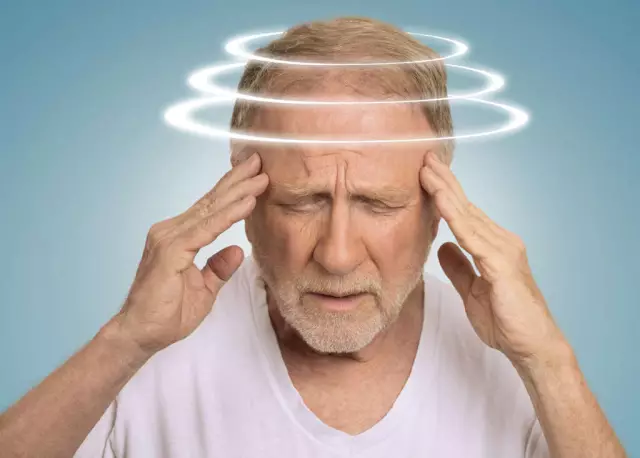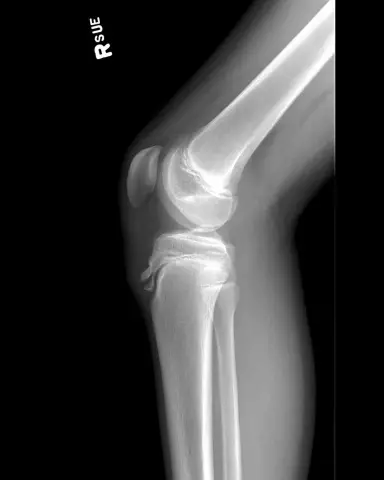- Author Rachel Wainwright wainwright@abchealthonline.com.
- Public 2023-12-15 07:39.
- Last modified 2025-11-02 20:14.
Meniere's disease

Meniere's disease is a disorder of the inner ear that causes an increase in the amount of fluid in the ear cavity. The disease is named after the French physician Prosper Ménière, who published an article in 1861 in which he was the first to report that vertigo can cause internal disturbances in the ear cavity.
Meniere's disease is characterized by sudden dizziness, feeling of pressure, tinnitus, and hearing loss. Hearing loss is temporary and occurs alternately in one ear and then in the other ear.
Meniere's disease can be a consequence of diseases such as:
- Syphilis;
- Kogan's syndrome;
- Autoimmune disease of the inner ear;
- Family dysautonomy;
- Perilymph fistula;
- Multiple sclerosis;
- Acoustic neuroma;
- Hypo- and hyperthyroidism.
Meniere's disease is an idiopathic disorder associated with endolymphatic edema and excess fluid in the inner ear. Symptoms of Meniere's disease can be aggravated by middle ear infections, herpes virus, head injury or upper respiratory tract infections, aspirin, cigarette smoking, alcohol consumption, or excessive salt intake.
Ménière's disease affects about 190 out of 100,000 people. Recent studies show that the disease affects women in adulthood more often than men.
Meniere's disease symptoms
Meniere's disease in the initial stage manifests itself with one symptom and gradually progresses. It is difficult to diagnose it initially.
The symptoms of Meniere's disease are:
- Dizziness attacks that can last from several minutes to several hours, but not more than 24 hours;
- Temporary hearing loss;
- Nausea, vomiting, and increased sweating;
- Unilateral or bilateral tinnitus;
- Migraine;
- A feeling of pressure in one or both ears.

Dizziness can cause nystagmus, or uncontrolled rhythmic and abrupt eye movements, usually in the horizontal plane, which has a direct impact on eye coordination. Sudden attacks of dizziness can lead to sudden falls to the floor.
Diagnosis of Meniere's disease
Detailed diagnosis of Meniere's disease includes examination by an otolaryngologist, audiometry and magnetic resonance imaging of the head (to exclude vestibular schwannomas or the syndrome of gaping of the upper lunar canal). Meniere's disease is diagnosed only when all other diseases are excluded.
Treatment of Meniere's disease
Treatment of Meniere's disease can reduce the manifestation and reduce the incidence of syndromes, however, a complete cure for the disease is not possible.
Medication for Meniere's disease relieves dizziness and reduces nausea and vomiting.
The gradual loss of hearing cannot be cured by any methods, the disease leads to complete deafness.
Basically, treatment for Meniere's disease consists of controlling symptoms and reducing the frequency of attacks, and begins with the selection of a diet appropriate for the patient, which will reduce the intensity of attacks in the future.
Treatment for Meniere's disease includes:
- Taking diuretics that reduce the accumulation of endolymph in the inner ear;
- Quitting smoking, alcohol and caffeine;
- Taking antihistamines and sedative medicines, which have a suppressive effect on the vestibular apparatus;
- Reducing salt intake;
- Taking medications that improve cerebral circulation.
If drug treatment of Meniere's disease does not work, then surgery is used. Unfortunately, due to the complexity of the flow and imbalance in the ear balance, several surgeries guarantee complete hearing loss.
There are a number of non-destructive hearing operations that are designed to improve hearing. Steroids (dexamethasone) are injected into the middle ear to reduce inflammation and alter the ear's internal circulation.
Also, aromatherapy, yoga and tai chi, and meditation help to improve the condition in Meniere's disease.
YouTube video related to the article:
The information is generalized and provided for informational purposes only. At the first sign of illness, see your doctor. Self-medication is hazardous to health!






